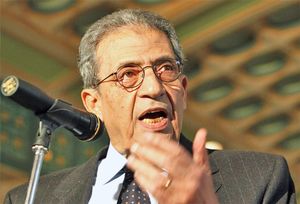|
By Catrina Stewart and Kim Sengupta in Tunis
Thursday, 20 January 2011
REUTERS

Amr Moussa, the secretary general of the Arab League: ’The Arab soul is broken by poverty, unemployment and general recession’
Tunisia yesterday began the search for the millions of pounds believed to have been stolen by the country’s ousted leader and his family as Arab leaders were warned that dire economic conditions could provoke a Tunisian-style revolt elsewhere in the region.
Switzerland also moved to freeze assets linked to the former president Zine el-Abidine Ben Ali, and around 40 others linked to the regime. Mr Ben Ali and his wife Leila Trabelsi, who fled the country last Friday after widespread and violent public protests, are alleged to have accumulated a fortune of £2.2bn during his 23-year rule. Their relations are also accused of gaining vast fortunes through illicit means.
Protests continued around the country yesterday against members of the embattled new government with links to the old regime. In its latest concession, the leadership headed by Mr Ben Ali’s long- standing Prime Minister announced that, in a "gesture of reconciliation", around 1,800 prisoners serving sentences of less than six months were being freed. Moves against Mr Ben Ali’s family were also made with the arrest of 33 of his relatives on suspicion of "crimes against Tunisia".
In Geneva, the United Nations’ human rights commissioner, Navi Pillay, said an assessment team was being sent to Tunisia to start work on charting abuses during the current disturbances during which, the UN estimates, around 100 people have been killed.
The events in Tunisia have inspired similar demonstrations elsewhere in the region, often at the risk of violent crackdowns by powerful security forces that are quick to stamp out dissent. In Algeria, thousands have marched the streets to vent their anger at rising food prices, while Jordanians have staged demonstrations against high unemployment. Egypt, Oman, Yemen and Libya have all witnessed large-scale protests.
"The Tunisian revolution is not far from us," said Amr Moussa, the secretary general of the Arab League, at a meeting of the organisation in the Egyptian resort of Sharm-el-Sheikh. "The Arab citizen has entered an unprecedented state of anger and frustration." The Egyptian diplomat’s remarks were a stark warning to Arab leaders to address despair at high unemployment, soaring food prices and other economic woes. "The Arab soul is broken by poverty, unemployment and general recession," Mr Moussa said. "This is on the mind of all of us."
Few believe that a Tunisian-style revolt will sweep across the region tomorrow, in part because of the difficulty in channelling economic frustrations into a political strategy. Protesters and the political opposition are nevertheless emboldened.
The street vendor who triggered the Tunisian revolt when he set himself on fire after police confiscated his stall has sparked a wave of copycat self-immolations. At least 12 people have set themselves on fire – seven of them in Algeria, three in Egypt – in the past week.
Claire Spencer, head of the Middle East and North Africa Programme at Chatham House, described Mr Moussa’s comments as a "wake-up call" to the region. "It’s a warning to say that some of the pressure on the population has to be lifted," she said.
In an attempt to provide some relief to troubled economies, the Arab League countries said they would back a $2bn (£1.2bn) aid programme. The fund will go towards creating job opportunities at a time when the Arab world is experiencing an "unprecedented historical crisis," said the Kuwaiti ruler, Sheikh Sabah al-Ahmad al-Sabah.
The fund won only limited backing when it was set up last year, mainly from the oil-rich Kuwait and Saudi Arabia. Governments have been more forthcoming with their contributions in light of the upheaval in Tunisia, not least because the economic problems that sparked the riots, such as high unemployment, are similar to those experienced elsewhere in the region.
The League also committed to investing in Arab youth – "the most precious of all our resources and wealth" said the Egyptian President Hosni Mubarak, who chaired the summit yesterday. "The issue of unemployment will remain at the top of all challenges."
But analysts warned that joblessness could only be tackled through a loosening of state control over the economy, a trend that prevails in many Arab states, and encouraging the growth of a private sector.
|